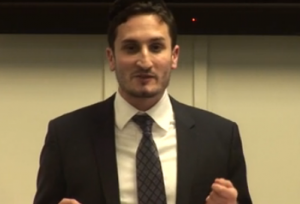 Dr. Yitzchak Goldberg doesn’t want you to make an error when it comes to dealing with children with Attention Deficit Hyperactive Disorder (ADHD), or with any children for that matter.
Dr. Yitzchak Goldberg doesn’t want you to make an error when it comes to dealing with children with Attention Deficit Hyperactive Disorder (ADHD), or with any children for that matter.
“If we think that our children aren’t good listeners, then there’s nothing we can do about it,” he told a crowd that gathered to listen to him at the Orthodox Union headquarters. “One of the misconceptions of children with ADHD is we have to tolerate them or work around them, but the truth is they can be amazing. We just need to structure things in the right way to appeal to their strength and create a certain environment where they will be successful.”
Dr. Goldberg, a school psychologist, is the middle school principal of Far Rockaway’s Yeshiva Darchei Torah and the co-director of the Diamond Program, an evidence-based summer program that treats children with ADHD and other behavioral issues. He delivered a wide-ranging presentation to two-dozen attendees on April 28 in a lecture sponsored by the Orthodox Union’s division Community Engagement division and Yachad, the National Jewish Council for Disabilities. The event was also broadcast via webinar to Jewish parents from more than 80 communities across the United States, Canada and Israel.
In an informative hour-and-half-long presentation Dr. Goldberg taught parents strategies for dealing with children with behavioral issues, from larger issues like oppositional defiance disorder to smaller ones like getting a child to stop complaining. In the first few minutes, Dr. Goldberg struck an optimistic tone about ADHD. There are two types of attention deficits, Dr. Goldberg explained, one where a child is paying attention to everything and loses sight of the task at hand, and the second, where a child has a generalized weak attention. Each attention difficulty, he said, can be worked with.
Parents, he advised, “have to be ER doctors… You have to have a good skill in reading situations why this behavior is happening so you’re equipped to respond.”
Throughout the lecture, Dr. Goldberg discussed a framework for understanding why behaviors happen in general through understanding the situations in which they occur and what reinforcements are causing the behaviors to occur. Reinforcement, Dr. Goldberg explained, “means making behavior stronger.” Positive reinforcement is the addition of something to make the behavior happen again and negative reinforcement is the removal of something to make the behavior happen again.
Peppering his conversation with examples from his own experience, Dr. Goldberg stated that “80 percent of misbehavior in a school setting is negative reinforcement… It’s kids trying to get out of work.”
The last two segments of the presentation were devoted to praising children correctly and issuing effective commands. He advocated praise-drills where parents should practice how to praise correctly.
“Parents are great at noticing when a child is doing wrong,” but he said, they need to work on noticing children doing things right.
Praise, he explained, must focus on the behavior, be directed towards something specific and connected with emotion and a value that a parent wants to stress. If used correctly praised can build resilience and a child’s motivation as well as strengthen the bond between family members. Instead of praising a child’s natural aptitude, like intelligence, Dr. Goldberg recommended praising a child’s work ethic, since that will build a child’s ability to persevere even in the face of more difficult challenges.
Somewhat controversially, when a parent issues a command, he or she should not say thank-you or please.
“Please communicates that I have an option,” Dr. Goldberg said, “Thank-you is not praise.”
When used effectively, Dr. Goldberg said that commands create a circle of reinforcement where a child receives praise for listening and then more praise for following through the command.
“The goal is to get the child to listen better and allow you to praise and reinforce him more for listening,” Dr. Goldberg said.
Liba Neuman, a school psychologist and parent, said she would definitely use the techniques she learned.
“I’m big into analyzing child behavior and I’m going to be looking into more research,” she said.
Rebbetzin Judi Steinig, associate director of community affairs for the Orthodox Union, said that large interest for the presentation tied into a need in the Jewish community.
“It shows how widespread the challenge of ADHD is in the Orthodox Jewish community and the eagerness of parents and professionals to find effective strategies to address it,” she explained. “The Orthodox Union is truly appreciative to Dr. Goldberg for sharing his time and professional skills with us.”
You can view the first presentation after registering here. The second part of the presentation will be available next week.
The words of this author reflect his/her own opinions and do not necessarily represent the official position of the Orthodox Union.